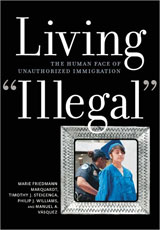"As has been the case for immigrant groups throughout the history of the United States from Plymouth Rock to Ellis Island, religious organizations play a central role for contemporary unauthorized immigrants and for the communities that receive them. In fact, churches frequently stand at the front line of the changing demographics in America, struggling with the challenges of being inclusive. By participating in churches, immigrants develop and practice the civic skills necessary to participate in U. S. democracy. Churches also can serve as spaces of encounter where immigrants and native born meet each other face-to-face; learn about each other's histories, cultures, needs, and aspirations; and move beyond stereotypes and prejudices. These human encounters may lead to new ways of framing the debate on immigration, introducing moral and ethical dimensions that have been missing in so much of the national discourse on immigration. Given the centrality of religious organizations for native born and immigrants, and given churches' historic role in struggles for social and racial justice, we believe that churches and other religious organizations are an indispensable resource to transform public opinion on the urgent need for immigration reform from the pews up.
"Religious organizations also play an important role in helping immigrants maintain connections with their places of origin, connections that sustain them during the arduous journey and the increasingly difficult process of settlement. In this sense, the transnationalism of today's unauthorized immigrants bears striking affinities to the one practiced by Jewish immigrants from eastern Europe at the close of the nineteenth century, when they created a rich array of landsmanschaftn, mutual aid societies, that kept them connected with their shtetls in Russia, Poland, and the Ukraine."
